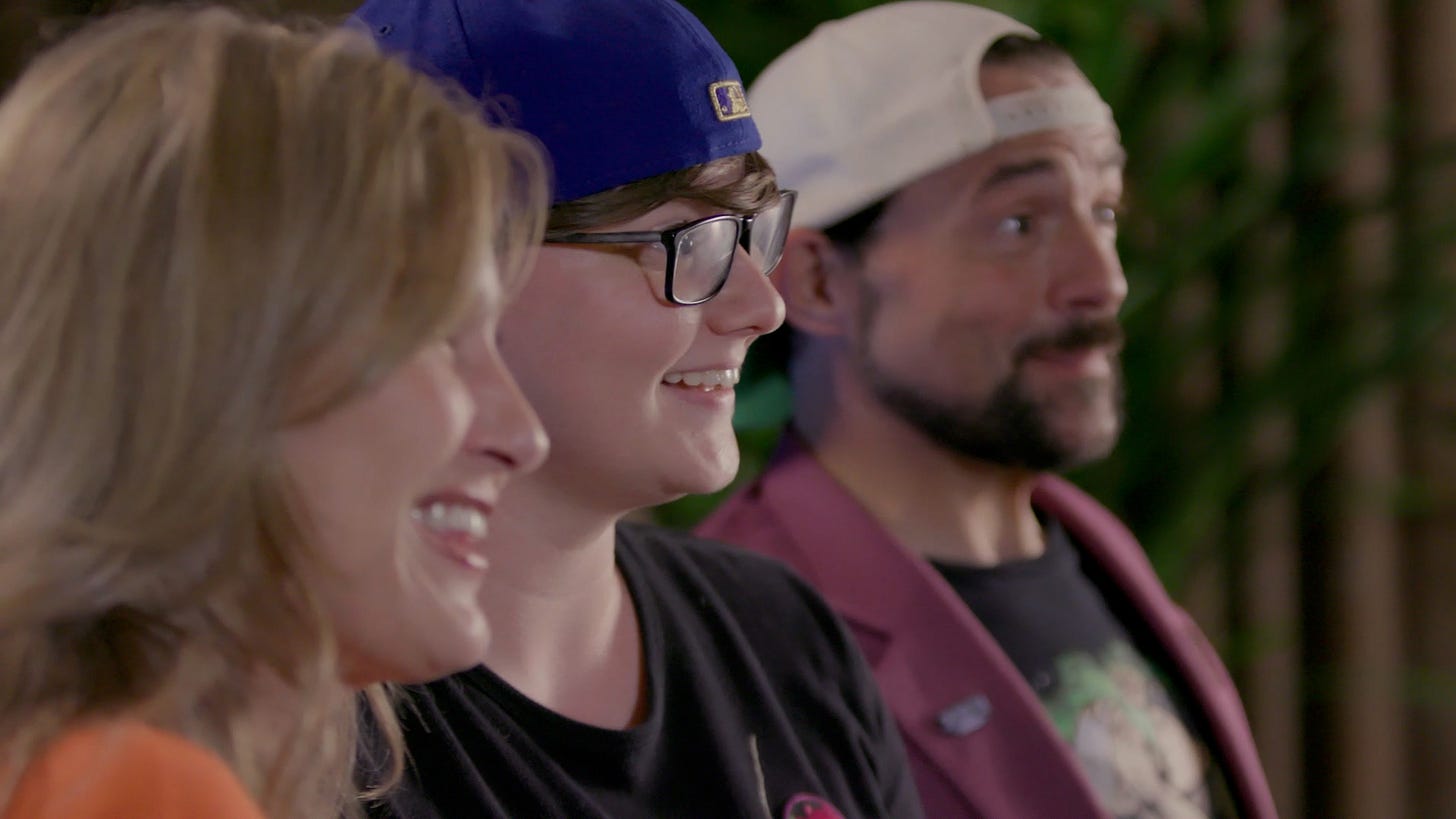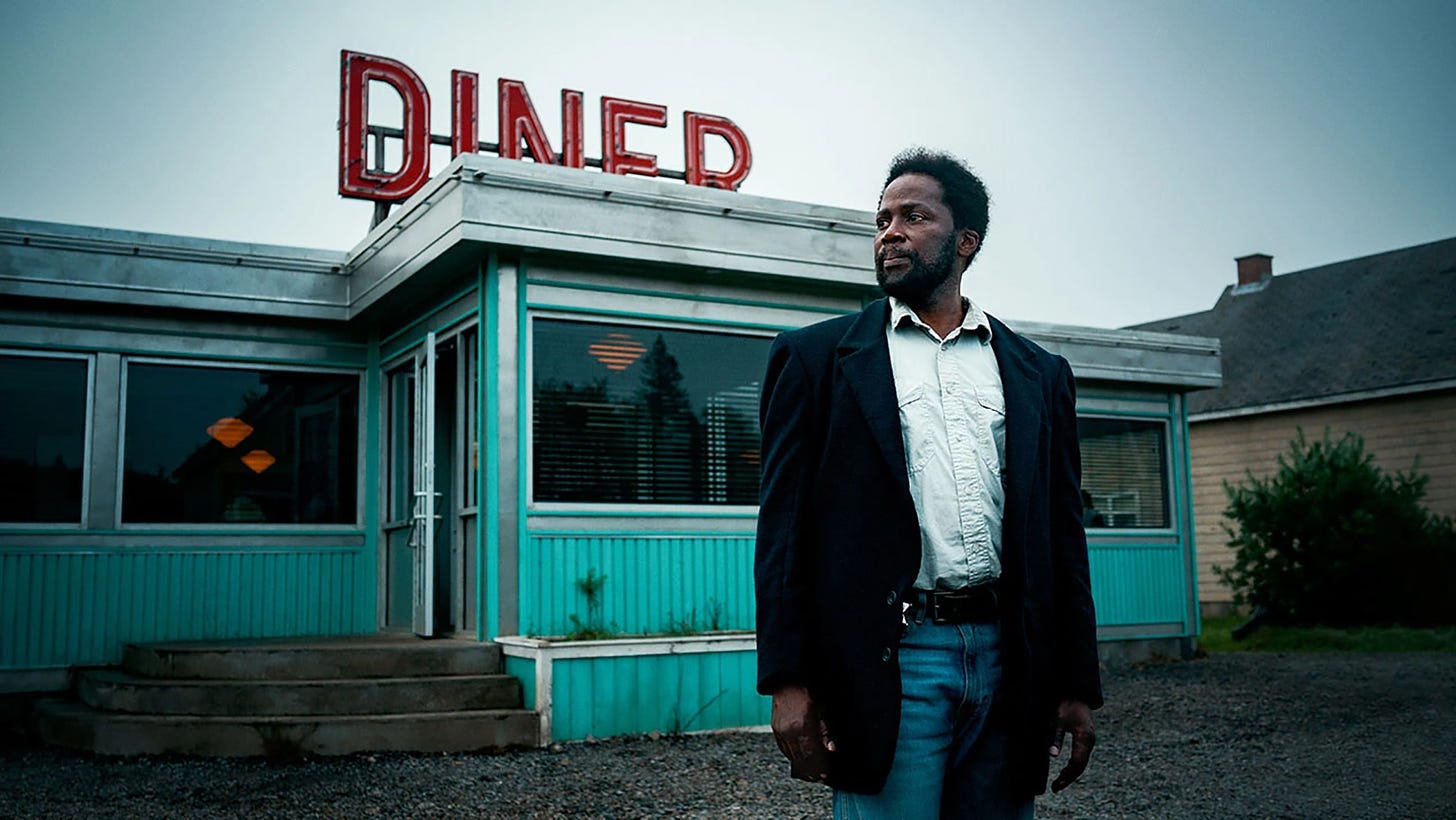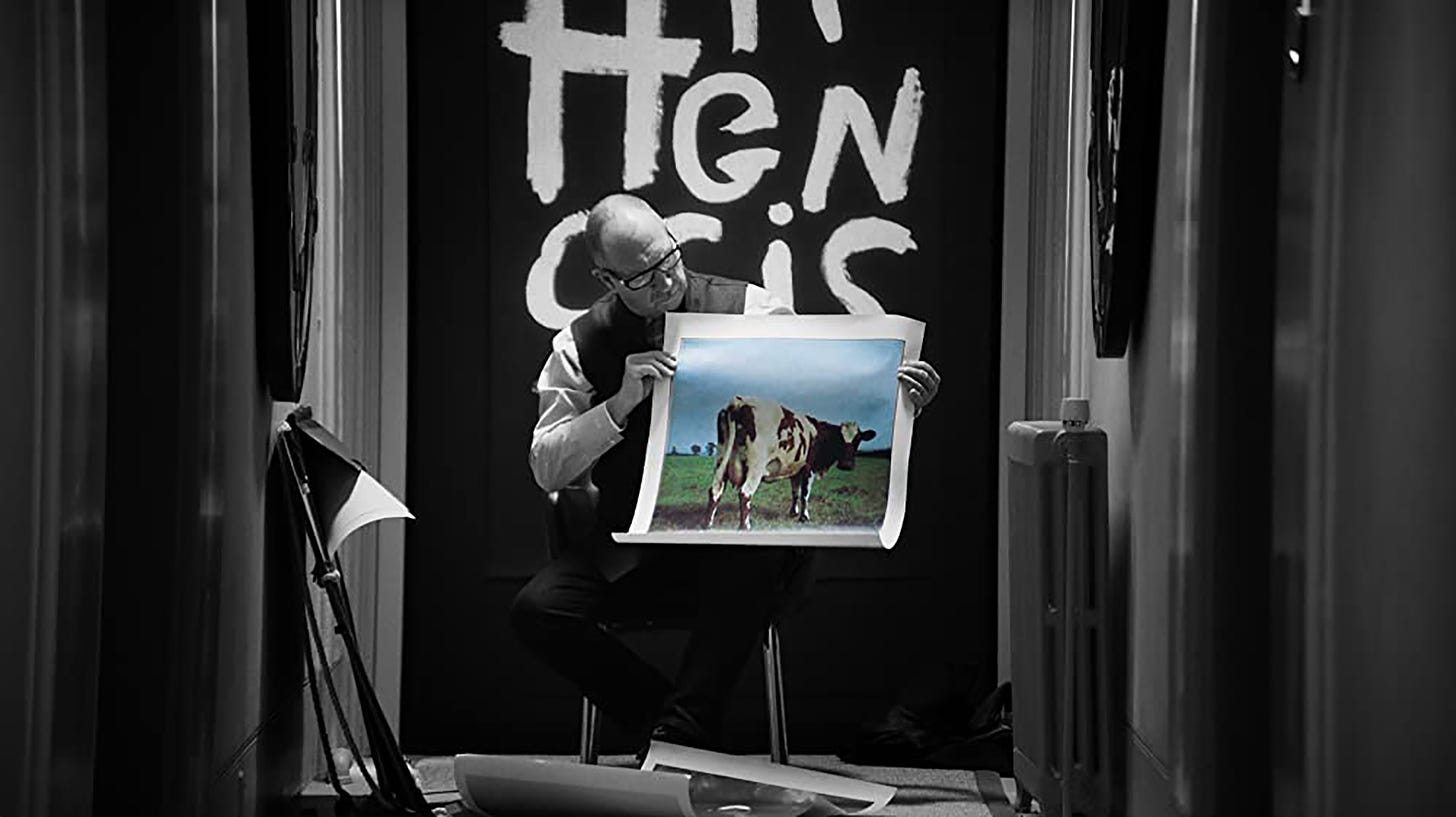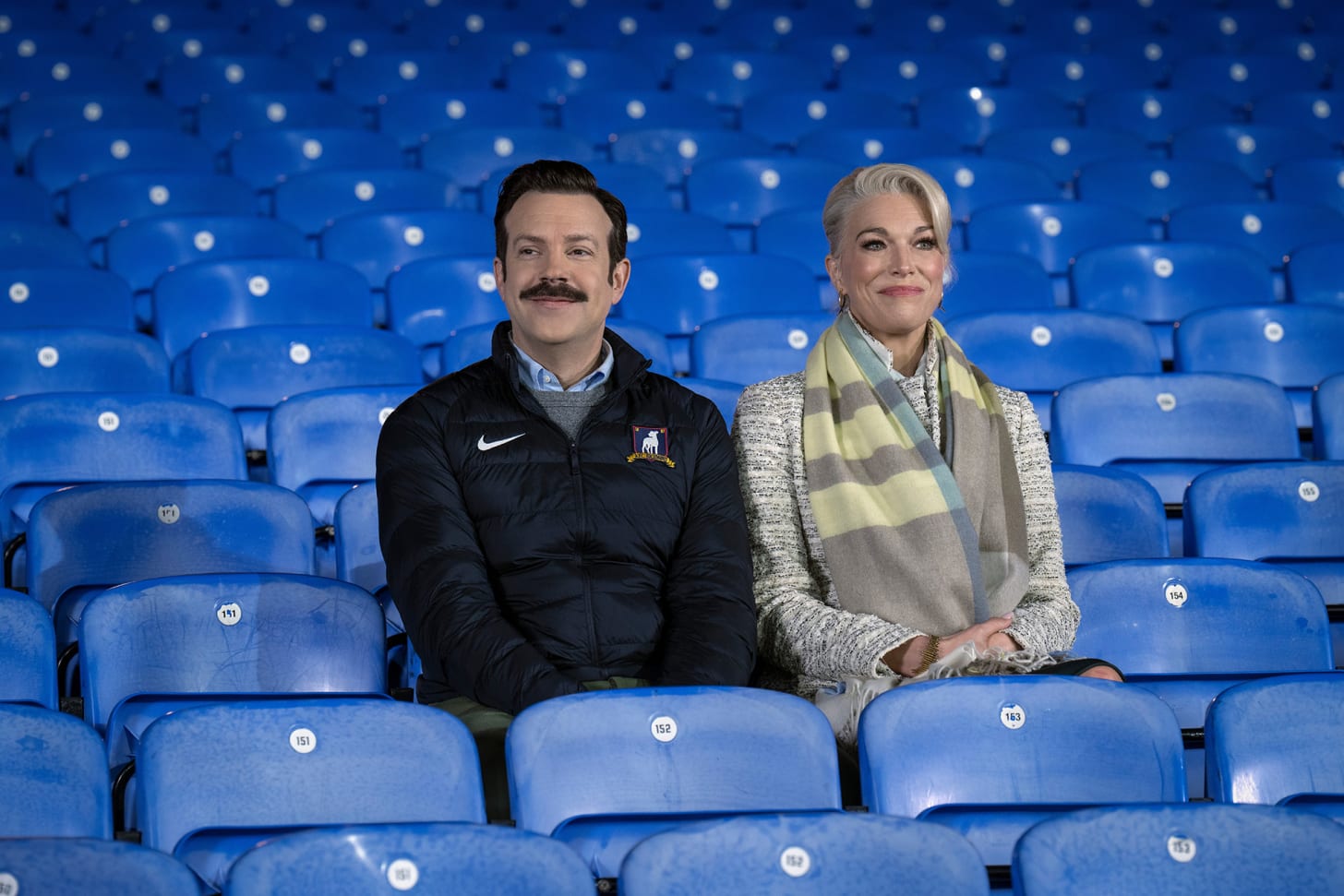Apologies for the extra-long newsletter this week. That’s what happens when I finally get some time to watch things early and save them for their embargo dates. Although the NHL Playoffs hitting the Stanley Cup Final and thus only having games every other night also opened a lot more time to consume screeners.
I have thoughts on three entertaining seasons of TV below and yet I still feel as though I’m woefully behind on that medium. Whether it be MRS. DAVIS or both seasons of YELLOWJACKETS or THE UNDERGROUND RAILROAD, I still have so much to catch-up on. Getting FROM started and TED LASSO ended is definitely a start. But having I’M A VIRGO next week and season two of THE AFTER PARTY two weeks after, it’s always one step forward and two steps back.
My first Tribeca review is included here too as it was the only one whose embargo lifted. So, two more will be coming next week. And Fantasia emails have already started hitting my inbox for their July dates too. The festival deluge has begun.
What I Watched:
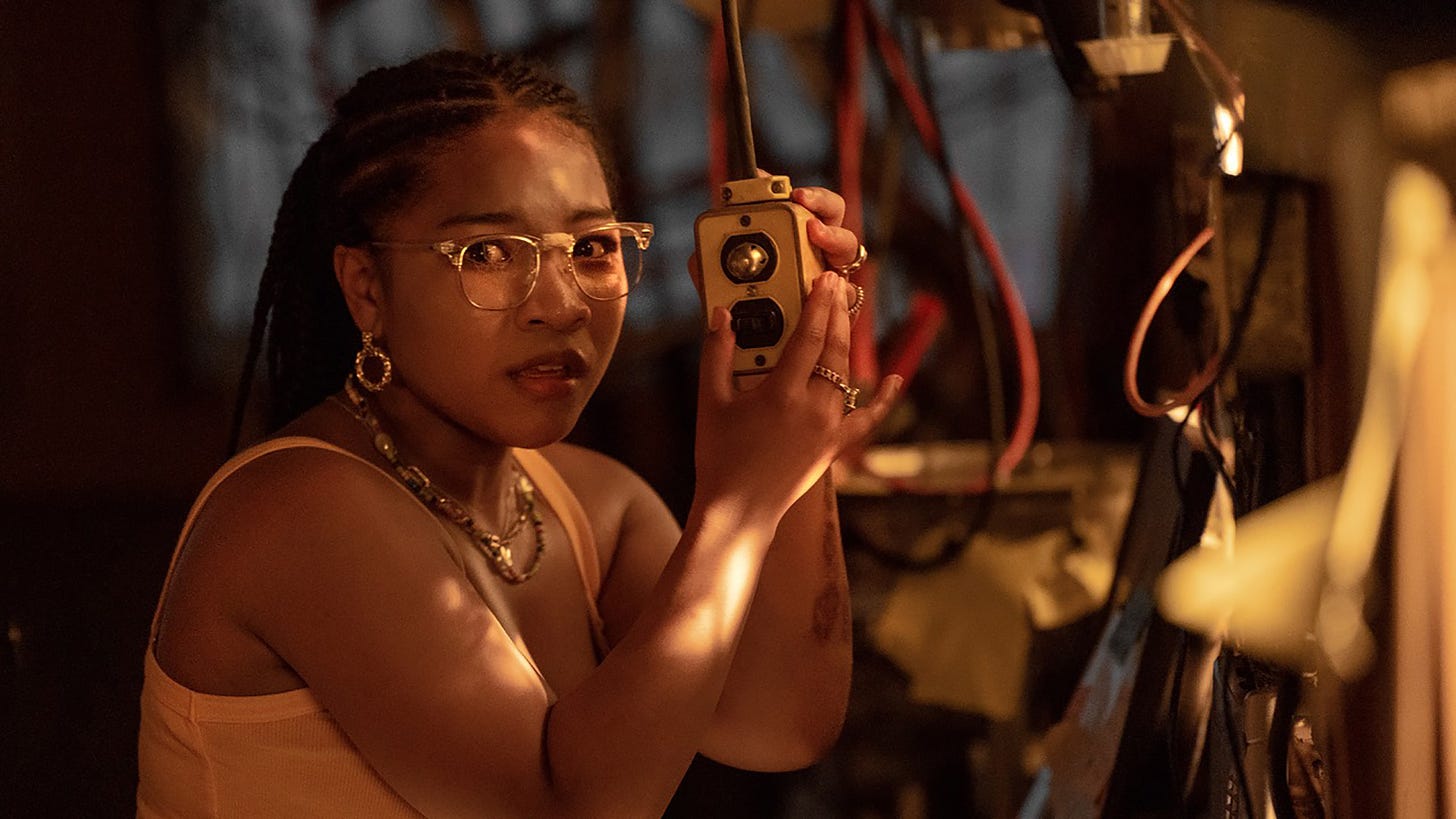
THE ANGRY BLACK GIRL AND HER MONSTER
(now in limited release; VOD/Digital HD on 6/23; ALLBlk and Shudder later in 2023)
It’s a chicken/egg conundrum. Do people call you a monster because you are one? Or are you a monster because that’s all they ever let you be? Writer/director Bomani J. Story delves into the difference with Vicaria (Laya DeLeon Hayes) and Chris (Edem Atsu-Swanzy), the central siblings of his FRANKENSTEIN update THE ANGRY BLACK GIRL AND HER MONSTER. Their mother died by a stray bullet. Chris died by a purposeful one while working for neighborhood drug kingpin Kango (Denzel Whitaker). Vicaria decides to never suffer that pain again by building a laboratory in an abandoned unit of their housing complex that’s driven with the philosophy that death is a disease and, as such, must be curable. It’s not therefore a trick when we meet her dragging a corpse out of frame. Her science can only advance with experimentation and experimentation demands resources.
What Vicaria cannot anticipate upon bringing her long-dead brother back to life, however, is that his biology will not resemble the person he used to be. A decomposed brain leaves him grunting while the fear of those around him ignite an impulse to violence. So, is he still Chris? Maybe not. Can he eventually become more like the Chris from before? Maybe—if the world allows it. Whereas that stipulation in Mary Shelley’s original “modern Prometheus” looks to turn the mirror onto the public’s monstrousness in a general sense, Story’s version is much more specific. Because to an innocent little girl like Jada (Amani Summer) next door, Chris is the same man she always knew. To see him is to simply say, “Hello.” To Vicaria and her father (Chad L. Coleman’s Donald), Chris is forever changed. They know he was dead. They know what the decomposition of his flesh means. Their fear makes him a threat.
Now move the dial even further to Chris’ former trigger-happy gang and the police and it doesn’t matter who the man/monster in front of them is/was. Kango’s guys see an unknown commodity that puts their earnings at risk. The cops see a nameless Black body they have zero problem shooting first and asking questions never. It’s thus a very charged rendition of a familiar tale with numerous metaphors and comparison points littered throughout. There’s Vicaria going up against a white teacher who refuses to say her name correctly and calls security on her for daring to ask questions and demand answers. There’s Jada’s brother about to open the door for an obviously enraged policeman before Donald stops him and throws the deadbolt knowing there’s a good chance that warrant-less cop starts shooting under the bigoted belief their very existence makes them monsters too.
With great practical makeup and effects to up the horror quotient once Chris is set loose on the neighborhood amongst adults refusing to believe he’s anything but an abomination (bringing someone back from the dead isn’t possible so why would anyone think otherwise?), Story’s film does a really good job pulling FRANKENSTEIN into the twenty-first century. I do think the genre conventions get in the way of fully mining the psychology of the updated concept, though. Too often Hayes’ Vicaria is forced into fight or flight scenarios that prevent the whole from escaping its surface thrills. We know she’s suffering and struggling to find her place in a world that dismisses her genius and imagination on sight, but it feels like exposition so that the premise can deliver its kills rather than the larger point. Because there’s also something to Vicaria’s actions making her complicit to the overall prejudice that seems glossed over (Kango and Reilly Brooke Stith’s Aisha do approach it). Hopefully our knowledge of that complexity sparks conversations on the way home regardless.
- 7/10

BASED ON A TRUE STORY: Season 1
(now streaming on Peacock)
While obviously reductive, I couldn’t help thinking Craig Rosenberg’s pitch for BASED ON A TRUE STORY was probably along the lines of: What if BREAKING BAD, but a sitcom? The earmarks are there. Ava (Kaley Cuoco) and Nathan Bartlett (Chris Messina) aren’t dying of cancer, but their marriage is definitely on the rocks with both fantasizing about other people while desperately hoping their impending new baby might somehow right the ship. Things only get worse once her real estate agent’s one shot at a huge commission fails, pushing her back to the prospect of selling apartments again, and his former tennis pro’s assumedly permanent position as head coach of a palatial club evaporates in favor of a younger, gimmicky replacement. With nowhere to turn for help (because asking their RICH friends admits failure), they decide to embrace the financial potential of a booming market: murder …
Podcasts. Murder podcasts. Sorry. That’s an important detail. Because neither Ava nor Nathan kills anyone. At least not yet. But one must understand a hard truth about the effect true crime mania has on society. It’s a topic that inevitably comes up during the show because the enterprise that the Bartletts embark upon with the help of their plumber Matt (Tom Bateman) exists in a very gray area of moral complicity. Once you start monetizing another’s trauma, you become an exploiter of pain. Maybe you can mitigate that reality by donating proceeds to funds in the victims’ names or by compensating family members, but being for-profit in any way automatically marries you to the crime itself. Because you need that body count. If serial killers the world over stopped, your gravy train is done. So, maybe you start getting cavalier about it. Maybe you start provoking these mystery men and women to do more. Go bigger. It’s an ecosystem wherein no one involved (listeners too) is innocent.
That’s Rosenberg’s motive. To call the ambulance-chasing public out for fostering a culture where homicidal maniacs earn followings similar to sports stars and Hollywood celebrities. One episode even takes place at a murder convention. Comic-con for serial killer fanatics. You can’t therefore help but agree with Ava’s sister Tory (Liana Liberato) when she in turn calls out the anonymous podcast the Bartletts have created for voluntarily platforming a serial killer. Because while Ava and Nathan’s idea is ingenious in a capitalist sense wherein someone is simply meeting demand (wanting to hear from real killers) with an exclusive supply (the local “West Side Ripper”), what are the consequences? Whether the podcast is real or not doesn’t even matter since you’re still profiting off the deaths of young women. You’re still normalizing a heinous act of violence by pretending. When do people who should know better become as bad as the psychopaths who can’t stop?
This last question is where the show gets really interesting because the answer is easy: instantly. Coming up with the idea is the moment you lose the benefit of the doubt because a sane, well-adjusted person should laugh. They should smile and joke about how wild it would be to team-up with a real murderer and make millions of dollars before admitting they’d call the police and turn him/her in instead. By letting Ava and Nathan jump into the deep-end, Rosenberg and company make it so all bets are off. As is often said throughout this first season, they might as well go all-in if they’re risking ruining their lives anyway. Go big or go home. Double-down. Turn complicity into partnership. Numb yourself to the reality that your conscience has already been shut off and admit everything is fair game. Why not just kill someone yourself too?
Add that attitude to a dog-eat-dog world of vanity and jealousy (there’s a joke that Ava and Nathan are the only married couple too stupid not to be having affairs) and everything becomes possible to the point where each episode earns its shocking surprise revelation. What happens if someone close to the couple discovers what’s going on? What happens when Ava and Nathan decide things have gone too far? Or if only one does and the other coaxes them back to the ledge? In many respects this show isn’t about murder at all. It’s about the adrenaline rush of spontaneity. How impulsiveness and gambling can suddenly make this boring couple that lost their way sexy again in the other’s eyes. If everyone else is having fun, why can’t they? Ruby (Priscilla Quintana) might be having too much. But appearances can be deceiving. What looks like happiness can just be a mask hiding the same depression Ava and Nathan wear on their sleeves.
I’m not sure how long this concept can go on, but BASED ON A TRUE STORY definitely has the juice for these fast-paced and darkly hilarious eight episodes averaging around thirty minutes a pop. And Cuoco and Messina carry each one since they’re the only characters who know everything that’s really happening (even if they might not be fully in control). The cold feet. The exhilaration. The rejuvenation. And, of course, the realization of who they’ve become. It’s a complex mix of emotions that hit home a lot heavier than you might expect considering the absurdity of the concept. Add Bateman’s scene-stealing devil on their shoulder and you can catch the glint in their eyes as they push themselves further and further from the human beings they must be to raise the unborn child listening from the womb. Because those fantasies that play out on-screen eventually prove much tamer than the reality. Don’t therefore be surprised when something wild occurs without someone suddenly waking up. Truth is crazier than fiction.
- 7/10
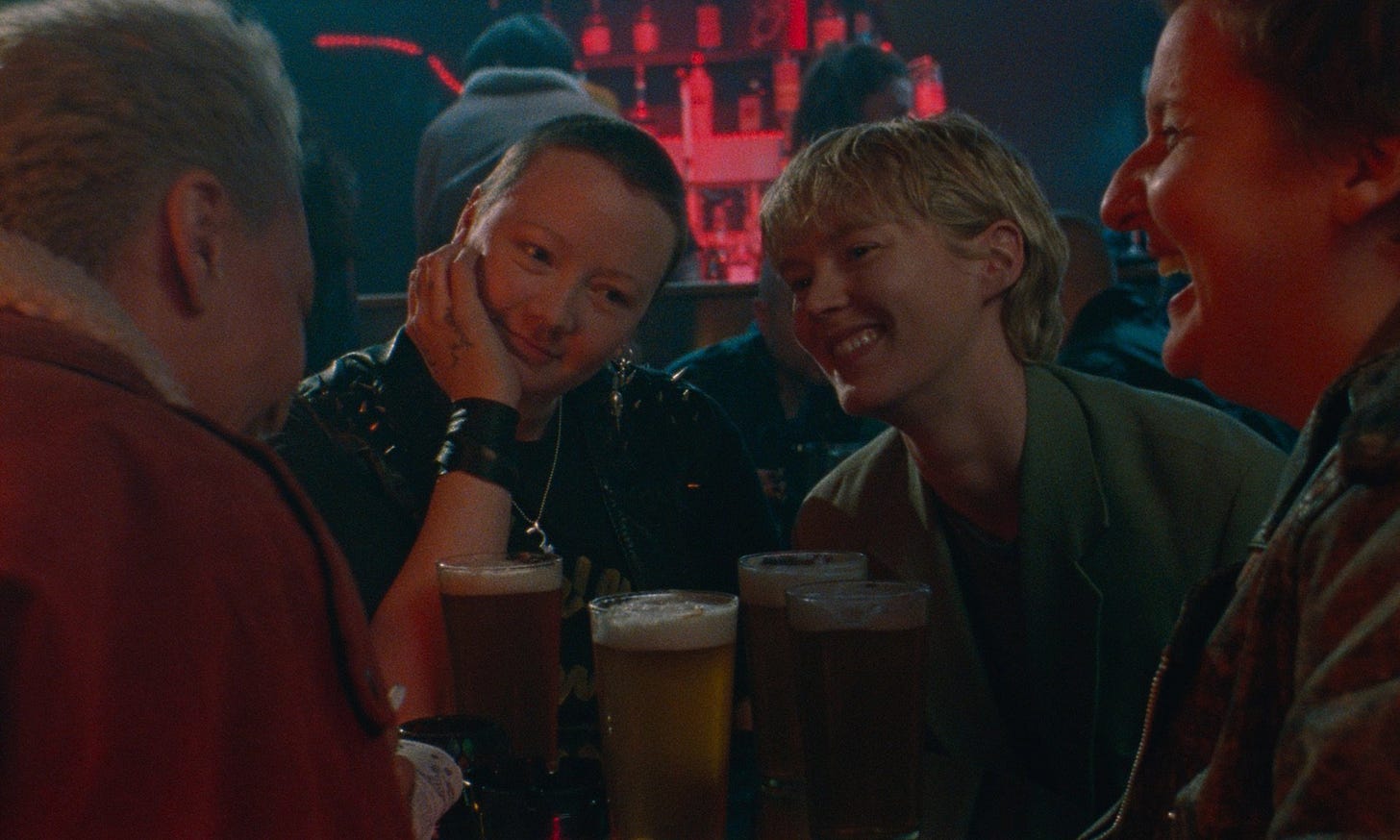
BLUE JEAN
(now in limited release)
“Jean is no hero.” That’s what writer/director Georgia Oakley says before revealing it to be the reason her story was so rewarding to tell. Because it’s the complexity of being caught between worlds and identities that intrigues. The authenticity of being trapped into believing your voice only has the power to destroy your life rather than save others. This is what the LGBTQ+ community had to contend with during Margaret Thatcher’s reign in England courtesy of laws like Section 28 vaguely (intentionally so) stating that schools and local governments couldn’t “promote” homosexuality. Much like laws being passed in America today, the premise itself is flawed since no one is trying to promote homosexuality. Even if they were, you can’t “turn” someone gay. Tolerance doesn’t convert. It merely provides the safety and empathy necessary to accept.
So, when the means to allow yourself to be your true self is prohibited for a large portion of the population through systemic homophobia, what is there to do but hide? Rather than tell a story about a closeted woman dealing with the stress of pretending she’s someone she’s not, however, Oakley’s BLUE JEAN presents a character who’s forced to choose in a way that leaves her destined to either fail her community or herself. What’s worse still for Jean (Rosy McEwen) is that she knows this fact from experience. She was that young lesbian let down by a society that stigmatized her sexual orientation. She witnessed the ridicule and unabashed bigotry of everyone around her to the point where conformity became the only way to survive. It wasn’t until after she married a man that it became too much. But by then she was a gym teacher. To live honestly now means risking everything else.
We meet Jean at the height of this fear. All those details about her past are sprinkled throughout the text with an elegant potency mainly driven by a sister (Aoife Kennan) who’s never shy about reminding her that her support is conditional. The film is thus allowed to delve into Jean’s anxieties and present her an opportunity to do better than what was done for her. We’d like to believe such a goal is guaranteed—that we’d never perpetuate the insidious lies pertaining to “normalcy” that are dictated by a myopic ruling class. But it’s not that easy. Not when you can be fired without cause. Or accused of sexual assault. Or simply found guilty of being gay. Jean must wonder if her bosses know she got divorced. If they speculate about her shorter haircut. If a student jokes that she was looking at her in the showers. And if Jean isn’t on edge enough already, just imagine what happens when a student (Lucy Halliday’s Lois) turns up at her usual gay bar.
Oakley does a fantastic job creating a comment on Section 28-era Britain without overtly focusing on the law itself. All we need is a billboard, a few radio snippets, and the not so whispery whispers of peers to understand the climate. The drama is therefore in how Jean reacts to the gradually tightening noose around her neck. Neighbors watching through their windows as her girlfriend (Kerrie Hayes’ Viv) leaves. Teachers asking if she has a “man.” Her sister questioning “trust” when relying upon her as a babysitter for her nephew. McEwen delivers an unforgettable performance as a woman caught between the love of her partner and the acceptance of her career when one could very well erase the other in an instant. Understanding this struggle doesn’t make things easier, though. It actually makes things harder. Because you can’t begrudge someone for choosing self-preservation. And your disappointment in them will never be worse than their own.
- 8/10
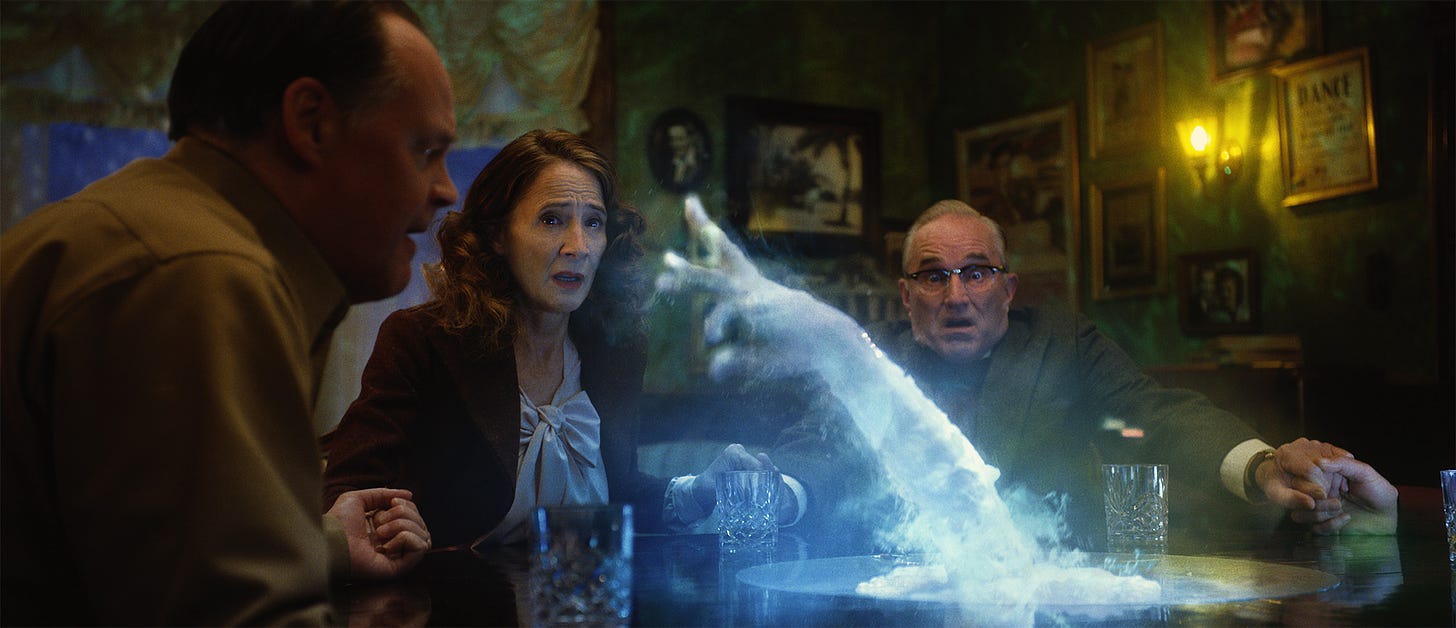
BROOKLYN 45
(now streaming on Shudder)
Before the ghosts appear and tensions rise to homicidal heights, writer/director Ted Geoghegan ensures we understand exactly who his characters are at the start of BROOKLYN 45. Maybe it’s a line of dialogue like retired interrogator Marla Sheridan (Anne Ramsey) tellingly reminding her CIA analyst husband Bob (Ron E. Rains) that she married him because he’s so sweet. Or the purported war criminal Mjr. Archibald Stanton (Jeremy Holm) catching his reflection in the glass of an American flag case, getting lost in judgment while weighing his patriotism against his morality. For me it’s a brotherly hand on the shoulder from Mjr. Paul DiFranco (Ezra Buzzington) being met by its target’s steely glare, reminding him the man he calls his best friend isn’t just “Hawk”. No. He’s Colonel Clive Hocksatter (Larry Fessenden). There’s nothing like a shot of PTSD to ensure he won’t forget again.
This quintet wishes they could simply be Marla, Bob, Archie, Paul, and Hawk, but that’s no longer possible with an event as traumatic and world changing as WWII marking their very souls. Whether they’ll admit it or not, it’s that truth that has kept them apart so long. The war’s been over for three years and they haven’t all been together since Marla and Bob’s wedding, so this occasion has an air of celebration even if none has anything to celebrate considering memories of war crimes, nightmares, and, most recently, Hawk’s wife’s suicide. It’s the latter that finally gets them together. Hawk called in search of “hope” and they rallied to help. What they couldn’t know until sitting down, however, is that he sought to find it via a séance. With his faith waning and mind losing its grip on reality, he needs proof of an afterlife. If one spirit—any spirit—speaks to them, Hawk can move forward knowing he’ll see his Susie again.
Blame it on the booze, guilty consciences, a premature release of hands, or all the above, but things turn about as dark as possible at the sound of a gunshot. Add the reason for why Susie killed herself (nobody believing her when she said their German neighbor, Kristina Klebe’s Hildegard Baumann, was a Nazi spy) and the line separating civilians picking up the pieces of their lives post-war from ex-soldiers whose devotion to the cause can only manifest as paranoia with their enemy defeated disappears. Will Archie still follow his commanding officer’s orders to kill despite no longer being on the battlefield? Will Marla use the skills she currently abhors to torture innocents on the whims of a bloodthirsty superior trained to kill the “other” his country created (because a lack of Nazis will turn sights onto communists, LGBTQ+, and whomever else threatens the status quo that keeps white American men in power)? Is Hildegard actually a Nazi?
What’s great about BROOKLYN 45 is Geoghegan’s refusal to reduce the answers to lazy plot devices. Nothing that happens on-screen is solely to provide the audience a resolution. It’s about pushing his characters against the wall to see whether they bend or break. Because there are still unspoken truths that prove as palpable as their dated and/or misjudged preconceptions of each other. Truths that are in some cases unspoken to themselves too. That’s war’s power. It forces you to justify horrific acts of violence in the name of patriotism and heroism without supplying the necessary support to deal with the ramifications beyond “Boys’ Club” promises and self-serving betrayals. Whereas that one ghost will soothe Hawk’s uncertainty, it will rock the others to their core because of the regret they hold in their hearts. The result is an acting masterclass that unfolds like a stage-play with each “hero” exposing the blood spilt to earn that title. Because despite any ceasefire or treaty, the mark of hate never dissolves. Not for survivors, bystanders, or future generations. Some wounds never close. They fester and consume.
- 8/10
CHASING CHASING AMY
(screening at Tribeca)
When you first hear about Sav Rodgers’ CHASING CHASING AMY, it’s easy to presume the finished project will be a fan-centric lovefest of a work of art with a controversial history and relationship to its subject. That’s not inherently a bad thing, though. I loved CHASING AMY when I first saw it twenty years ago and still enjoyed it a lot upon rewatching it in preparation for this documentary. There’s something worthwhile in reconciling nostalgia with newfound clarity and context. Of being able to balance the good with the bad without discounting one or the other. And to Rodgers’ credit, despite starting this project from the perspective of how Kevin Smith’s indie darling “saved his life,” he never shied away from that reality. He chooses the right people from the film to interview and the right culture critics and in-the-know contemporaries from the era to intelligently dissect the film’s place within the cinematic and LGBTQ+ canons.
Because regardless of his own feelings about the work, the first line of questioning he pursues is one that acknowledges its flaws. That’s both with its creator (an always reflective Smith), its champions, and its detractors. Why do members of the LGBTQ+ community dislike it? Do you understand those critiques? Can you find something worthwhile within it anyway? These are very interesting queries and the answers from experts and/or people who lived it are genuinely honest and sometimes surprising. They are also necessary insofar as accepting how the messiness makes it more important as a time capsule that exemplifies everything wrong with the era in which it debuted. That it took a white cishet male’s perspective on lesbianism to bring the topic to the mainstream in 1997 even as films like Guinevere Turner’s GO FISH were screening beside it. That you needed a character as crass and homophobic as Jason Lee’s Banky to provide an entry point for audiences that wouldn’t otherwise spend money on a queer film.
But Rodgers’ film is also a lot more personal than pointing out the obvious. You can’t watch CHASING AMY today without remarking on its unintentional critique of biphobia or its best, heartfelt moments being baked in insensitivity and ignorance via the unavoidable fact that Smith’s lesbian is in many ways still that unrealistic fantasy Banky places next to Santa Claus and the Easter Bunny even if the role of Alyssa Jones and performance by Joey Lauren Adams transcends it. That stuff is great and relevant, but it only scratches the surface because it’s an intellectual read on an art form that’s more interested in earning an emotionally visceral reaction instead. So, we follow Sav’s own journey of self-discovery and identity as a trans man within the confines of the film as well as outside it while also, perhaps unintentionally, providing a platform for Adams to finally exorcise demons she couldn’t back then. Demons stemming from the industry’s abuses and how Smith’s auto-catharsis about their relationship left her pain unspoken.
The result is therefore much more than you could expect going in thinking, as Sav’s wife Riley did, that this endeavor was nothing more than a love letter to Kevin Smith. He, like CHASING AMY itself, is merely a touchstone. A springboard. Because while the film saved Sav, it disgusted others. While it gave bisexuals/pansexuals a glimpse of themselves on-screen, it also reductively provided caricatures of lesbians to others. It saved Smith’s career just as it served as a reminder of a dark time for Adams. By putting its production and impact and failings in context with Sav’s personal awakening, his documentary supplies a deep dive the likes of which couldn’t happen if a deep dive was the initial goal. By letting those involved witness Sav’s vulnerability, they in turn allow themselves to be vulnerable and speak truths that may ultimately color CHASING AMY worse in the end. And that’s okay. Because it’s not about success. It’s about legacy. How art has the power to create and destroy and how the best art does both.
- 8/10
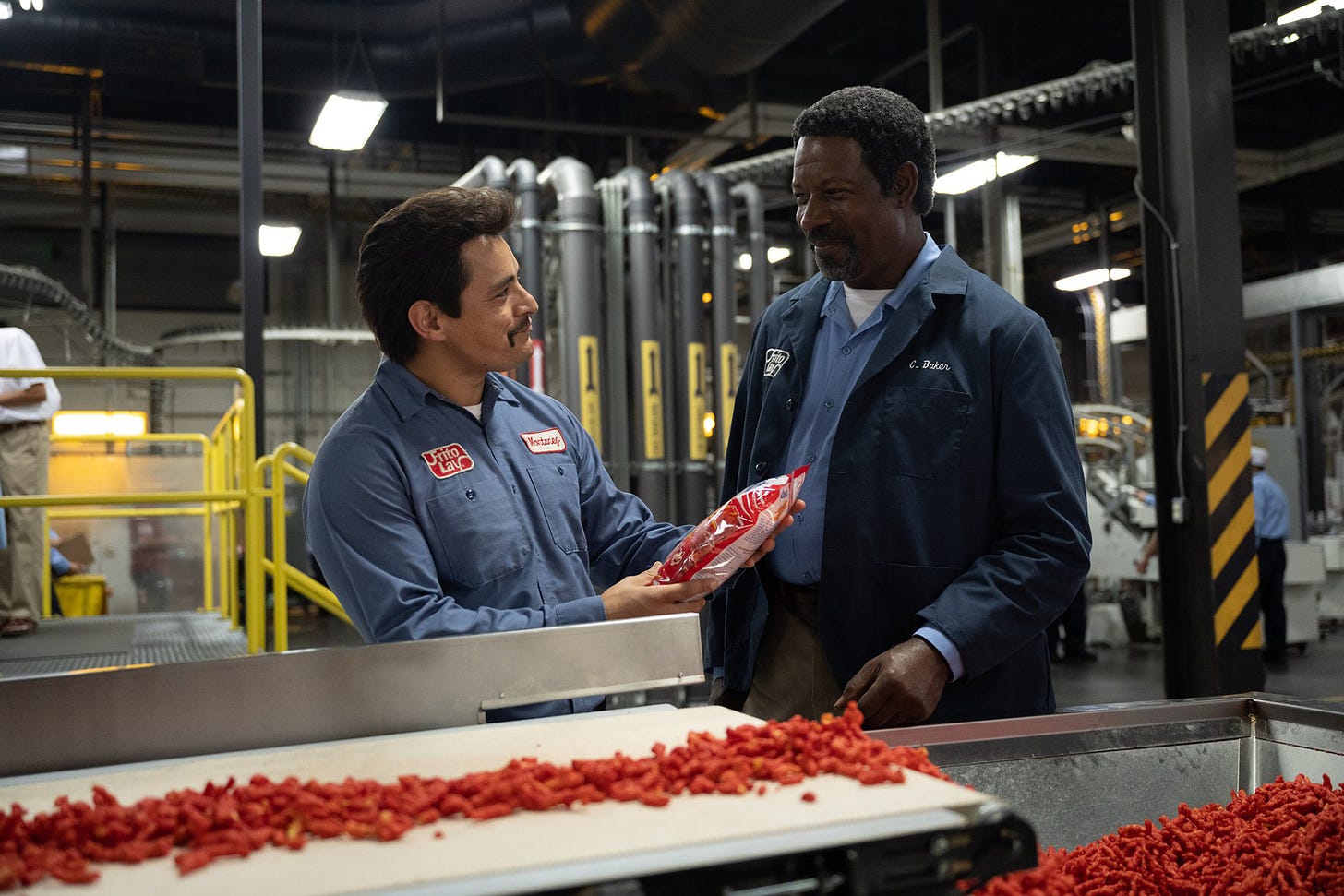
FLAMIN’ HOT
(streaming on Hulu and Disney+)
I would generally say that you should read a book if you want the truth, but Eva Longoria’s FLAMIN’ HOT is adapted from one that’s apparently not entirely true either. Adapted by Lewis Colick and Linda Yvette Chávez from subject Richard Montañez’s autobiographies A Boy, a Burrito, and a Cookie and Flamin' Hot: The Incredible True Story of One Man's Rise from Janitor to Top Executive, the film tells the tale of a streetwise Mexican American who discovered the power of marketing at a young age while wielding reverse-psychology to make his bullies try the burritos they were so quick to call him names over (and subsequently purchase them). It didn’t stop him from falling into crime as a teen due to America being built in such a way that crime was his only outlet for survival (drugs can be marketed too), marriage and fatherhood soon brought him to Frito-Lay as a janitor at eighteen.
Jesse Garcia is of course not eighteen, so learning that age courtesy of an end credit fact saying the real Montañez retired in 2019 after forty-two years of service had me questioning my math skills since it meant the forty-year-old actor was playing twenty-six for the majority of the film's 1990s setting. Let suspension of disbelief be your friend, though, because age doesn’t really matter here. It’s not about Montañez being a wunderkind. It’s about him persevering against all odds to not only make himself a success, but to do it while wearing his Mexican heritage proudly on his chest. It doesn't therefore matter that he was supposedly only a janitor for one year before graduating to a machinist in 1976. Dangling that carrot in front of his face for almost two decades on-screen becomes an incentive for the fictional Richard. That struggle causes him to “think like a CEO.”
It’s a motto that comes courtesy of actual CEO Roger Enrico (Tony Shaloub) when the economy tanked and the company hoped to inspire their ranks towards innovation. Montañez takes it to heart with help from his friends (Dennis Haysbert’s engineer and Bobby Soto’s drug dealer) and family (Annie Gonzalez as his wife Judy) to create a new flavor that could inspire his community’s untapped potential as a key American consumer demographic. Longoria and company are therefore humanizing a very capitalist story—turning exploitation into ethnic pride. So, of course PepsiCo would embrace these origins even if they themselves issued a 2021 report refuting their factual basis. Pepsi looks like a great corporation here who listens to their workers on the lowest rung of the ladder because “it takes all kinds” even if we know in our hearts it was a total fluke at best. They wouldn’t lend their brand if the film wasn’t also an advertisement itself.
And that’s fine because the feel-good narrative works. Garcia and Gonzalez are funny, endearing, and dramatically complex those few instances when the script allows them to be emotional (mostly opposite the always great Emilio Rivera as Richard’s reformed, abusive father). Longoria has fun with her narrator by having Montañez speak over other actors as they mime his embellished “hood” affectation before rewinding to show how vanilla these executive exchanges actually look behind closed doors and she proves she has what it takes to tug at heartstrings and entertain at the cinema alike. Because while it may not be particularly memorable or unique, FLAMIN’ HOT makes good on its promise to bring a lesser-known rags to riches tale of Latino exceptionalism to the masses in a self-deprecatingly comedic fashion. After all, whether Montañez truly invented the seasoning pales in comparison to the reality that his high school dropout did ultimately ascend to the executive suite.
- 6/10
FROM: Season 1
(streaming on Prime)
The comparisons to LOST are unavoidable as John Griffin’s FROM opens in a town full of people who have no clue how they arrived or how to get home. Rather than all together via a plane crash, however, they’ve found their way here separately. Each individual or group was driving along in disparate parts of America only to inexplicably find their path blocked by a fallen tree. We experience the phenomenon by way of the Matthews family (Eion Bailey’s Jim, Catalina Sandino Moreno’s Tabitha, Hannah Cheramy’s Julie, and Simon Webster’s Ethan) as they turn around to hit whatever exit they just passed, eventually finding themselves in a broken-down town of people doing all they can to ignore them. It’s an intentional maneuver by the residents because they know what comes next. The Matthews must discover it on their own.
The gist is this: the town is the only place on this road. Drive left or right, it doesn’t matter. You will inevitably loop back to the same derelict gas station and diner despite moving in a straight line. And if that seems impossible, just wait. Because things get worse. As Sheriff Boyd (Harold Perrineau) and Father Khatri (Shaun Majumder) try to explain in the best way they can to incredulous strangers with no reason to believe them, every night sees monsters walking and whispering with the sole ambition to skin and disembowel each one of them alive. Only by the grace of carved talismans hanging by the door of every building are they given a semblance of security. The monsters aren’t able to enter without being invited now. So, they take human form and spin their lies to find a sympathetic ear. One mistake is all they need to decimate the entire community.
We’re therefore left with three mysteries. What is this place? How did they all get here? And how can they escape? Griffin and company do a great job ensuring everything that occurs centers on those three questions. So, rather than feel as if it’s spiraling out of control like LOST often did, each new clue feels deliberately placed along an existing blueprint with an already completed endgame. Whether or not that’s true (or if MGM+ will continue renewing the show to get there if it is) remains to be seen, but the sheer fact that it feels that way is enough to let the waves take you without any fear of drowning. The characters on-screen are scared enough for the both of us—especially now that a rare yet not wholly unique event has occurred. Two new cars arrived on the same day to usher in a bloodbath after three months without a casualty.
FROM wears its intensity and utter lack of sentimentality on its sleeve. I could be mistaken, but I’m pretty sure someone—and I mean someone who initially appears to be a series regular—dies each and every episode in varyingly grotesque ways. Why now if Boyd had 96 Days written on the incident chalkboard outside his post office-turned-police station door? Maybe it was just a matter of time. Maybe it’s because fate brought two cars and with them some yet unknown curse. Or perhaps it was precisely that period of peace that pushed the dark forces in the woods to tip the scales back. Because while Boyd, Khatri, and Donna (Elizabeth Saunders’ matron of Colony House where residents stay to “live despite the danger” rather than simply survive like those residing in the town) believe they’ve found a system to combat their demons, they don’t know everything that’s going on.
So, while the premise owes a lot to LOST, I’d say the show itself is more like THE WALKING DEAD in tone and construction. The flashbacks are few and far between outside of “Broken Windows, Open Doors” shedding light on Boyd’s arrival and a scattering of memories by way of Victor (Scott McCord), the longest tenured citizen and thus the most messed up psychologically since that tenure began when he was but a boy. Instead, we’re dealing more with where these characters are going and how the stress of their existence weighs on their shoulders. Some hear voices (Avery Konrad’s Sara). Some see visions (Jade). Others find acclimating difficult (David Alpay’s rich wunderkind Jade initially thinks the place is an elaborate escape room for him and him alone). So, if the monsters don’t turn good people bad, the people might do it all on their own.
It leads to an engrossing puzzle box of a season with authentic character growth that endears us to the likes of young lovers (Corteon Moore’s Ellis and Pegah Ghafoori’s Fatima or Ricky He’s Kenny and Chloe Van Landschoot’s Kristi), indecipherable eccentrics (Victor and Sara), and a “normal” dysfunctional American family (the Matthews clan). Secrets are exposed at a surprisingly rapid pace whether it be tidbits from the characters’ pasts or observations made by newcomers that no one else had noticed. And all the while this notion of security and community hangs by a thread with the threat of one drunkard deciding to open a window after dark. It allows the whole to be a powder keg ready to blow. To let characters question their rigidity and choices while forcing others to confront their guilt and regret.
Details arise to start hypothesizing answers (you can’t help yourself from compiling everyone’s “tree” stories together to see if there’s a common denominator as far as why they were chosen either through emotional state or original destination, etc.). More mysteries come to light that cause you to wonder if the entire thing is some elaborate test cobbled together too quickly to dot every “i” and prevent its prisoners from looking too closely. So, while you can get lost in your own head guessing, there’s always enough on-screen to occupy your time so Griffin can provide what we need to know when we need to know it. With an effective cast (it’s not the most well-known or polished collection outside Perrineau, but they all pull through) and great special effects, it becomes hard not to want to keep going after every cliffhanger. Because its purposeful machinations guarantee every high and low hits home.
- 8/10
SQUARING THE CIRCLE (THE STORY OF HIPGNOSIS)
(now in limited release)
You know that iconic album cover you love from that seminal 1960s or 70s rock band? It was probably designed by Storm Thorgerson and Aubrey "Po" Powell’s Hipgnosis. And with the former passing away in 2013 while the latter, as well as their contemporaries/client list spanning Roger Waters and David Gilmour to Robert Plant and Jimmy Page to Peter Gabriel and beyond, moves into his twilight years, it’s about that time when putting the shared history of their work on the record becomes a now or never sort of prospect. That Anton Corbijn would come aboard to direct only seems fitting since, like Powell, he’s built his career off photography, art direction, and music video work in the rock sector. He and screenwriter Trish D Chetty make SQUARING THE CIRCLE (THE STORY OF HIPGNOSIS) an entertaining and educational account of how the scene’s drugs, art, and egos created the timeless imagery that defined a musical generation.
Powell is the obvious “star” of the show with a wealth of archival footage of Thorgerson to flesh out their thought process and evolution, but having the aforementioned rock legends and an always-game-for-a-memorable-sound-bite Noel Gallagher to inject backstory and anecdotal detail is priceless. Add a handful of friends and co-workers to the mix and you can start to the feel the pure energy that went into igniting a literal shift of perception and possibility in the medium. It was no longer about just putting an image of the band on the cover. You could be abstract, avant-garde, and absurd. You could even be willfully obtuse and difficult in order to create a buzz or a laugh at the expense of the band, the audience, or, in many cases, the record label. As long as the music sold and the money flowed, budgets became obsolete. To many people of that era, the artwork became as important to the vinyl as the songs themselves.
This isn’t a documentary on album design, though. There aren’t any talking head experts comparing, contrasting, and/or defining Hipgnosis’ work in relation to others of the moment (despite some contemporaries in the field lending their insight about the duo itself). Corbijn’s assignment was Powell and Thorgerson’s partnership. How they met. How they befriended Pink Floyd, backed into cover design, and subsequently began their legacy in the field. It’s about their process. The push and pull in the studio, collaboration with their clients, and the candid accounts of the volatility that can be born out of having so many headstrong narcissists in the same room vying for their voices to be heard. Don’t therefore expect any insight into Powell and Thorgerson’s solo careers either (I personally love the stuff StormStudios did with The Mars Volta, Muse, and Biffy Clyro in the 00s). It begins with Po walking into Storm’s flat as a sixteen-year-old and ends with their studio’s inevitable dissolution in 1983.
So, rather than gain insight into the industry, the film’s worth is in its captivating stories about the phenomenon that was these two men. Blowing up the red balls from The Nice’s ELEGY with a bicycle pump in the Sahara. Collaging multiple shots in the rain to manufacture a seamless, hand-tinted artwork for Led Zeppelin’s HOUSES OF THE HOLY. Murphy’s Law causing chaos on-site as they tried to capture Roger Waters’ helium-inflated pig above the Battersea Power Station. Every single cover has its own backstory that excites even when it comes down to “it took about two minutes to decide” because we’re hearing it from those who lived it. Things can get melancholic with talk about Syd Barrett and full-on hilarious with Gallagher reminiscing about having to explain to his twenty-first century daughter what “cover artwork” even is too. But beyond the first-hand accounts and historical timelines is also the centering of Powell himself. Because Thorgerson is the “name”. Google some Hipgnosis covers and find that many sites forget to include his partner at all. Hopefully, that won’t be the case anymore.
- 7/10
TED LASSO: Season 3
(streaming on AppleTV+)
I either did a good job avoiding most talk about the latest season of TED LASSO or everyone is crazy because the few bits that did get through seemed to skew very negative. Maybe I watched a different show—or, as I’ve found to be the case, most serialized media does work better when watched together rather than weekly—but I absolutely loved what Jason Sudeikis, Brendan Hunt, Bill Lawrence, and Joe Kelly did to provide their show a truly perfect ending. It’s not like it was going to be an easy task either. Not when Season 2 did so much to break down the optimistic façade of toxic positivity while also breaking apart the core nucleus of characters into three distinct sectors (Nick Mohammed’s Nathan Shelley moving on to manage West Hampton and Juno Temple’s Keeley Jones opening her own pr firm while the rest remained at Richmond). Thankfully they realized it wasn’t about bringing everyone back for one happy ending, but giving each their own.
For being twelve episodes averaging almost an hour each, it flies by pretty quickly too thanks to a willingness to cut out the extraneous segues from one episode to the next. In many cases we’ll have transported weeks into the future. Losing streaks will have snowballed towards catastrophic lows and winning streaks towards catastrophic highs in the margins so that we can focus solely on how these people are reacting to them. The show has never been about Ted Lasso’s (Sudeikis) x’s and o’s, but his ability to motivate and care for the people he loves even if he still cannot do the same for himself. How will he navigate the external noise of a media wanting to pit him against Nate as a rivalry (with Hunt’s Coach Beard’s help considering he’s lost all love for the former kit man turned prodigy)? How will he cope with his ex-wife dating a new man and his son’s struggles with their distance all while playing father figure for a ragtag bunch of talented footballers?
Enter Trent Crimm (James Lance), no longer of The Independent. The journalist is now freelance writing a novel about how Lasso and company have turned AFC Richmond around. He becomes our surrogate—a fly on the wall experiencing the chaos and drama in real time himself. His presence in the locker room allows for heavier subject matter (Billy Harris’ Colin Hughes being gay, Toheeb Jimoh’s Sam Obisanya juggling celebrity and politics via restaurant ownership and social media, and Phil Dunster’s Jamie Tartt coming out the other side of his trauma) to land without hijacking the plot. He can crook an eyebrow when something interesting arises, directing our attention either directly (in the room) or indirectly (cutting away to let us into Nate’s and Keeley’s lives in ways that connect while also supplying space). Trent becomes the glue holding the season together, a floating narrative device that keeps everyone honest about their emotional growth.
All that and there’s still the wealth of romantic interludes beyond the scoreboard. Keeley gets a new love interest whose impact both helps propel her forward into this new career and knock Roy Kent (Brett Goldstein) back to have to learn where he’s gone wrong (and, eventually, learn again). Nathan navigates the duplicity of his new boss in Rupert Mannion (Anthony Head) and how he operates in a transactional manner rather than the empathetic and personal touch both Ted and Rebecca Welton (Hannah Waddingham) utilize at Richmond, figuring out that the former supplying its spoils quicker doesn’t mean any part of it is better—ultimately fueling positive confidence from within to counteract the negative self-loathing that had ruled his actions. Love for Rebecca, Colin, Sam, and others also comes and goes, enhancing story lines and evolving characterizations without needing to steal attention in the process. Lust has been replaced by life.
What these characters craved and lost in Season 1 and then demanded and won at a too-high price in Season 2 is suddenly no longer the priority. Yes, they all want to win. They all want to be loved. They all want to prove someone wrong. But to what end? If you’re willing to burn every bridge in London to get to the top of that hill, what will be left when you get there? It’s a metaphor written into the fabric of this season both figuratively and literally with the answer being: lightning. Whether that volatile electricity will be good or bad is up to them, though. Will Keeley let other people dictate her future or retake the reins? Will Nate lose himself to the womanizing and materialism of his new mentor or will he realize success isn’t worth the suffering wrought by the resulting wake? Can Ted repair the broken heart that put him on a plane to England in order to heal his own soul like all the conflicted misfits he’s healed along the way?
Much like Rebecca telling Keeley that pursuing her dream and rising to her potential isn’t abandonment, Season 3 is putting every single character onto their necessary path towards the same. That’s how you pay it forward. You take the trust that is given to you and meet the occasion to give your trust to someone else. Maybe Ted Lasso is a bit like Mary Poppins in that way. It just so happens that he’s also (more so) Mr. Banks. It’s that duality that makes this show tick. That complexity to be the fixer who also needs fixing. It’s why he’s endeared himself to the world as profoundly as he has the players and co-workers on-screen. He’s a mirror unto our own insecurities and uncertainty. A man trying his best who realizes that he can’t do so honestly or authentically without acknowledging the difficulty of treading water first. Ted sets the example. His presence makes it so everyone else can become a shoulder to cry on too … even Roy F*cking Kent.
- 9/10
Cinematic F-Bombs:
This week saw BLUE CHIPS (1994), BROKEN ENGLISH (2007), DROWNING MONA (2000), RESCUE DAWN (2007), and STARTING OUT IN THE EVENING (2007) added to the archive. The world is right now. Nick Nolte is in the collection. cinematicfbombs.com
New Releases This Week:
(Review links where applicable)
Opening Buffalo-area theaters 6/9/23 -
CLOSE TO VERMEER at North Park Theatre
MASTER GARDENER at North Park Theatre
“You couldn't render MASTER GARDENER riper for ill-conceived social commentary if you tried. Because he doesn't even try to approach the psychology of what he's created. It's literally all for kicks.” – Full thoughts at HHYS.
MENDING THE LINE at Transit Regal
MOON GARDEN at North Park Theatre
“So, while visually gorgeous in its commendable, if incomplete, message about the power of "healing", the smiles at the end feel more like resignation to me.” – Full thoughts at HHYS.
TAKKARI at Elmwood Regal
TRANSFORMERS: RISE OF THE BEASTS at Dipson McKinley, Flix & Capitol; Maple Ridge & Market Arcade AMC; Elmwood, Transit, Galleria & Quaker Regal
Streaming from 6/9/23 -
BROOKLYN 45 - Shudder (6/9)
Thoughts are above.
FLAMIN’ HOT - Disney+ & Hulu (6/9)
Thoughts are above.
THE WONDER WEEKS - Netflix (6/9)
YOU DO YOU - Netflix (6/9)
HOW DO YOU MEASURE A YEAR? - Max (6/14)
Full thoughts on all 2023 Oscar Shorts at The Film Stage.
JAGGED MIND - Hulu (6/15)
Now on VOD/Digital HD -
ARE YOU THERE GOD? IT’S ME, MARGARET. (6/6)
HOLLYWOOD DREAMS & NIGHTMARES: THE ROBERT ENGLUND STORY (6/6)
MASTER GARDENER (6/6)
“You couldn't render MASTER GARDENER riper for ill-conceived social commentary if you tried. Because he doesn't even try to approach the psychology of what he's created. It's literally all for kicks.” – Full thoughts at HHYS.
RETROGRADE (6/6)
SAM NOW (6/6)
SHOWING UP (6/6)
“The result is a quiet comedy surrounding a high-strung introvert trying to be martyr and savior at once.” – Full thoughts at HHYS.
SOMEWHERE IN QUEENS (6/6)
97 MINUTES (6/9)
DALÍLAND (6/9)
FAST X (6/9)
HEROES OF THE GOLDEN MASKS (6/9)





